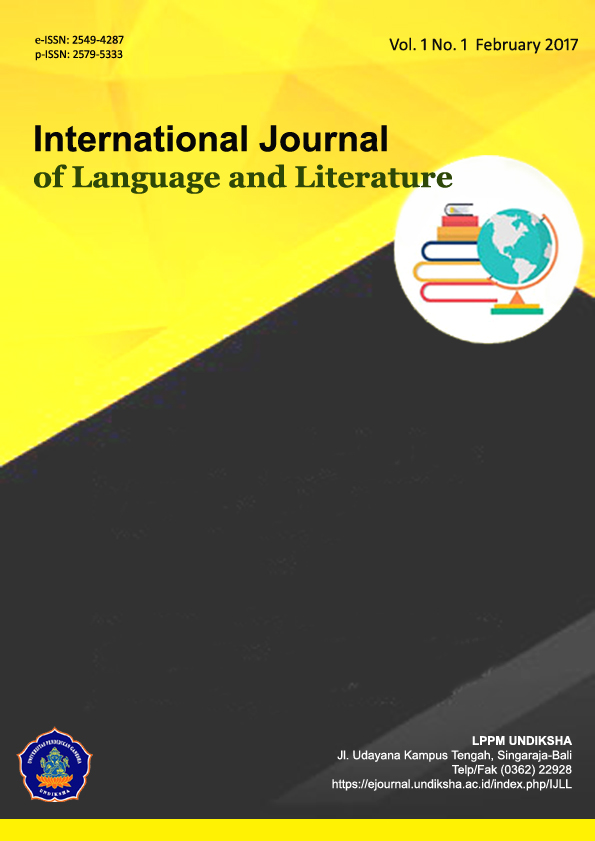DEVELOPING DIFFERENTIATED ELECTRONIC SUPPLEMENTARY READING EXERCISE FOR THE SLOW LEARNERS OF SEVENTH YEAR STUDENTS AT SMP N 2 SINGARAJA
DOI:
https://doi.org/10.23887/ijll.v3i1.20604Kata Kunci:
self-regulated learning strategies, English achievement.Abstrak
Self-regulated learning (SRL) becomes one of the crucial skill in nowadays era. The ability to regulate their own learning, helps students to achieve better. In order to prove that, this study aimed at investigate the correlation between SRL strategies and the student’s English achievement by using expost facto research design. 152 students were involved to be the sample of this study and asked to fill Motivated Strategies for Learning Questionnaire (MSLQ) developed by Pintrich (1991) as the data of their SRL strategies. For the achievement, the record keeping document were used. As the result, it was found that there is a significant correlation between SRL strategies and the student’s English achievement.Referensi
Banisaeid, M., & Huang, J. (2015). The Role of Motivation in Self-Regulated Learning and Language Learning Strategy: In the Case of Chinese EFL Learners. International Journal of Applied Linguistics & English Literature. 4(5), 36-43.
Blumenfeld, P. C., & Mark, R. W. (1997). Motivation and Cognition. In H. J. Walberg & G. D. Haertel (Eds.), Psychology and Educational Practice (pp. 79-106). Berkeley, CA: McCut-chan
Inan, B. (2013). The Relationship between Self-regulated Learning Strategies and Academic Achievement in a Turkish EFL Setting. Academic Journals, 8, 1554- 1550. doi: 10.5897/ERR2013.1561.
Olmscheid, C. (1999). The effectiveness of peer tutoring in the elementary grades. Long Beach: CSU
Perkins, D. N. (1992). Technology Meets Constructivism: Do They Make a Marriage? Hillsdale, NJ: Erlbaum.
Pintrich, P. R. & DeGroot, E. V. (1990). Motivational and Self-Regulated Learning Components of Classroom Academic Performance. Journal of Educational Psychology, 82(1), 33-40.
Pintrich, P. R., Smith, D. A. F., Garcia, T., & McKeachie, W. J. (1991). A Manual for the Use of the Motivated Strategies for Learning Questionnaire (MSLQ). Michigan: Ann Arbor
Pintrich, P. R. (1995). Understanding Self-Regulated Learning. San Francisco, CA: Jossey-Bass.
Pintrich, P. R. (2003). A Motivational Science Perspective on the Role of Student Motivation in Learning and Teaching Contexts. Journal of Educational Psychology, 95, 667-686.
Sardareh, S. A., Saad, M. R. M., & Boroomand, R. (2012). Self-Regulated Learning Strategies (SRLS) and Academic Achievement in Pre-University EFL Learners. California Linguistics Notes. 37(1), 01-35.
Schunk, D. H., & Ertmer, P. A., (2000). Self-regulation and Academic Learning: Self- efficacy Enhancing Interventions. In M. Boekaerts, P. R. Pintrich, M. Zeidner (Eds.), Handbook of self-regulation. San Diego, CA US: Academic Press.
Slavin, R.E. (2009). Cooperative Learning (Teori, Riset, Praktik). Bandung: Nusa Media.
Topping, K. J. (2005). Trends in peer learning. Educational Psychology, 25(6), 631- 645.
Zimmerman, B. J. (1989). A Social Cognitive View of Self-Regulated Academic Learning. Journal of Educational Psychology, 81, 329-339.
Zimmerman, B. J. (2002), Be-coming a Self-Regulated Learner: An Overview. Theory into Practice, 41, 64–70
Unduhan
Cara Mengutip
Terbitan
Bagian
Lisensi
IJLL Journal provides immediate open access to its content on the principle that making research freely available to the public to supports a greater global exchange of knowledge.

This work is licensed under a Creative Commons Attribution-ShareAlike 4.0 International License







